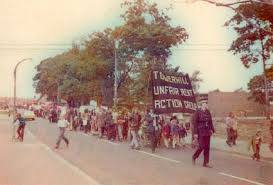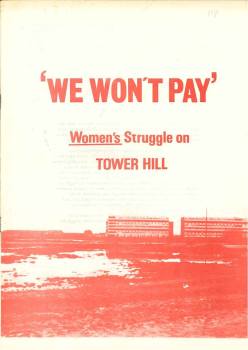The PhD Bubble by Kerrie McGiveron
Kerrie McGiveron is a first year PhD candidate at the University of Liverpool. Her research interests include New Left activism, second-wave feminism and specifically left-wing radical group Big Flame. You can follow her on Twitter @mardykerrie and read further blog posts at https://themardyhistorian.blogspot.co.uk/

“So how did your graduation go?”
“It was lovely,” I reply, staring at myself in the mirror of the hairdressers, bits of tinfoil clumsily sticking out of my head as the hairdresser smiles and asks, “what is it you’re doing again?” I shift awkwardly and mutter something about a PhD researching radical politics. She is smiling at me through the mirror and nodding – she wants me to tell her more, so I begin, but then I get tangled somewhere between talking about the role of women in the Kirkby Rent Strike and socialist-feminist activism. She smiles and tells me it sounds interesting.
The hairdresser is not lost, it is me who is lost.
Over a year earlier I had found a box. An old cardboard box in an archive with ‘Big Flame,’ written on it in black marker. I opened the box and out spilled leaflets, pamphlets and letters with the Big Flame red star logo on the front – calling for worker’s rights, better living conditions, and an end to gender inequality. It was exciting. Radical. I spent all day in the archive, reading and taking notes. Big Flame internal bulletins, diary-style entries, letters to each other, newspaper articles and flyers. Ideas came spilling out of my head and into my notes, obvious questions like who were this group? What became of them? How did they manage to produce all of this stuff? I waded through the documents and found some answers, and many more questions. So now, Big Flame consumes me. In finding that box and stumbling through the evidence I had found my project, and my work for at least the next three years.

I quickly came to realise that Big Flame worked nationally and had links with other radical groups abroad. This broadened my scope, and made me look to Germany, to Italy, to France. It was only when I began to think about my Masters dissertation that I realised I needed to look no further than my own front doorstep. Literally. Big Flame had been active in one of the largest rent strikes in the country in 1972-73. The Kirkby Rent Strike, in my home town, lasted 14 months and was undertaken by 3,000 residents in protest at rent and rate rises. Big Flame formed a women’s group on the Tower Hill estate in Kirkby, where they held meetings with local working-class women, distributed leaflets and pamphlets and worked to empower working-class housewives to fight for change. My focus narrowed. I stuck with my home town of Kirkby for my dissertation. I looked at gender and class and analysed the influence of the women’s movement on this uniquely socialist and feminist organisation. I looked at their legacies, and found that after Big Flame had flickered away, the women founded Kirkby Unemployed Centre in the late 1980s, on the very land that my house was built on. I finished my analysis of Big Flame’s involvement with the rent strike. But there was so much more to learn, so much more to do. I parked it mentally and promised to return to it for a chapter in my doctoral thesis.
Back to the hairdressers. I felt lost. I had no way to explain what I meant, I had somehow been stuck in my PhD bubble, fallen down the rabbit hole, lost sight of what I was trying to do. The woman with bits of tin foil in her hair was staring back, she was me, and I knew exactly what I was doing but struggled to find the words. As the hairdresser trimmed at my wayward hair, I began, “there was a rent strike, in the seventies. Most of the residents of Tower Hill went out protesting. There was a women’s group there. I’m researching that – I’m hoping to do an exhibition at the library gallery at some point.”
And just like that, I’d said it. I popped the bubble and found where I was.

0 Comments